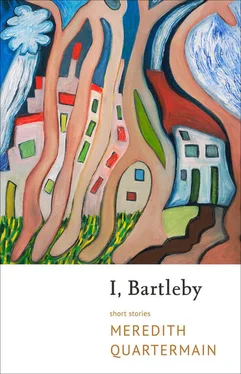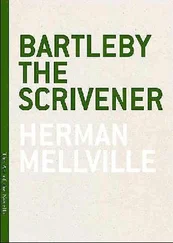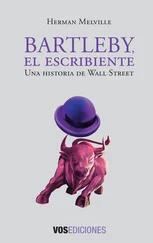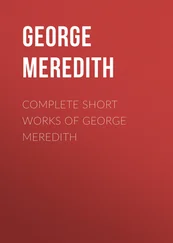and out of the blue or even pink or yellow, a magazine asked her to write a manifesto — a well-known, highly regarded magazine in which she had always wanted to be printed. She was more than a little dubious of the certainty of manifestos, which could end with — toes — this little piggy went to market and this little piggy cried all the way home. Manifestations en français waving placards. Boxifications of thought she’d rather seep and leak, divide into streamlets or runnels, soak out to unthought swirls at hard little word edges. The space between spoken and heard her showing toes would evoke, engage, enact.
She launched into forging worlds, what unshows itself — the manifesto of erasure and abeyance. The impulsive manifesto shoots rapid fire the least thought — the least considered — tips from her mind’s dumpster: bedsprings, televisions, one-eyed Eeyores, toaster ovens, hockey sticks. To dither the puck. Say and unsay. I want it all, she thought, shilly-shallying. A chord instead of a note. A symphony instead of a chord. A universe instead of a symphony. Closing it down in a word: universe. Or or a — it made no difference. It wasn’t a pause button, a light switch, a phone hook. A column of battalions from several empires waited. Would it be the onion or the peppermint? The shark or Mack the Knife?
Had manifestos become a bourgeois project? Was she jaded? To dither. To angst. Would it be the lion throttling a doe? Or the president shooting students? A woman stoned to death, or a woman suckling her child? Down another alley in the maze, why not a manifesto of the sentence? Crossbreed every kind with every other kind — twist and turn the thought shapes — so many butterfly nets. Une manifestation of clamouring motifs. Unsentencing the sentence. Smashing the piñata of complete thought to clouds of recombining viruses.
She paused on the trail and took a breath. Don’t look back. Don’t look down. Don’t look up at the fire tower on top of the mountain where she’d scattered the ashes of her mother — reaching her hand into the plastic bag inside the pottery urn Mom had kept on her shelf. Scooping up in her fingers grey dust and small pieces of bone. To fling out over the heads of fireweed and lupine and daisies as Mom had said she wanted, not feeling, when she said it, this nothingness of self as dust — the dust that had been her mother clinging to her jeans and boots. Breathing the dust that had been her, had made her.
Out of body, she’s in a cab on the way to the airport, away from home and husband — going to a poetry workshop in the Jack Kerouac School of Disembodied Poetics. He, R, beside her on the clapped-out cab seat — he, R, will teach but she’s not in his group — she’s chosen Rosmarie Waldrop — she could have chosen R — she did not. She flung out words in hot ugly gushes. How to speak so it wasn’t puke. Why do women always write about personal things, G the poet at the college asked her, agreeing with his friend that the only woman in Canada who could write was Alice Munro though no one could write like V. S. Naipaul, why don’t they write about what’s out there: objective reality?
How to talk so it wasn’t puke. How to converse in this cab with he, R, who talked of Dante, he who claimed Dante as his companion. How even to be in this cab with the hugeness of his poetry, his French and Latin, his panama hat, linen jacket, and chestnut woven shoes. Oh, speak to him for god’s sake. An hour till they board, an hour for her to be silent rude stone. Speak. She’s reading Gender Trouble , words like hegemony, ontological, totalized winging around her head spewing out hunches, glimpses that blow away again like papers in a wind, as though she suddenly had to give a lecture in French at the Sorbonne, having only grade-eight French. Hadn’t it been decided there was no objective reality? And must she, in order not to write puke, prostrate herself before some Olympian Dante?
Like who? Virginia Woolf? Gertrude Stein? Oh, she loathed that she loathed herself. How to simply be visible as he was, to speak visibly. She ventures her worries about G and his friend. Oh, he’s just stirring the pot, R tells her. The cab weaves through hot traffic, its dollar sign clicks higher. G’s a very good poet, R says. So this is the way it’s done — always speak well of other poets, even when they’ve said terrible things to you in the past, as G had when they were both young, calling he whose companion was Dante a “womanish soufflé maker.”
She — I — float like figures in a Chinese character, cat’s whiskers drifting off their cat, lingering sur l’air. She forgets I, I forgets She in character’s galaxy. I public / I publish, does I know She pubic hiding the mark of her? Does She know I ’s suit of gestures inside out? She caught in the rabble, in language’s heroism — the erect I displays her. Visible to some, invisible to many. She imagines visibility — then I forgets her TV screen and marches out in dark to darkness.
To be visible, stand for something — water, women, workers. Claim your She sealed in I ’s package. Or cut a figure, repeating asshole or road-squashed raccoon guts twenty times in your poem. Be pleasing. Who or what?
Jack Kerouac School of Disembodied Poetics. The packed lobby of the Boulder theatre, crazy with girls in Cleopatra hair, cigarettes pointing straight down from their lips, R and D drinking martinis at the bar, before the star reading. Burrito boys fold bundles of rice, beans, cheese, handing them out in red plastic baskets. Hers dripping salsa, cream, shrimp, and onions toward the only chair at a table where Allen Ginsberg…! Of course no one’s sitting there, grumpily shuffling his reading papers. She/I takes chair, bites into face-smearing guacamole — people rush up to him — hug him — joke with him — remember him in New York. Her fingers oozing salsa and cheese. Then someone tells her David Bromige can’t make it. He’s hit a wall. Maybe it’s his diabetes, She/I replies. Allen looks at her — David has diabetes?! All his life, she offers, the injection kind. Allen has diabetes, too, he tells her. Allen has cured his by eating brown rice and vegetables. He must talk to David.
Visibility — it would be like fluency in a language — she would have substance as a word in a dictionary. She could not be erased — it would flow out of her — not this conviction of nothinghood. Homework for Rosmarie Waldrop: write using counting or reduction, a set number of syllables, a letter avoided. He/R with one hundred students in the big white tent speaks of the reparable — a quality among things — we swimming among holograms of words — She/I flowing his words into her ear, down her arm, through her fingers in tattered thoughts across her notebook — the irreparable a position in relation to what surrounds. The poetics of relations now reversed — R’s phrase inscrutable as Chinese characters, her pen flying on to the next. The reparable, a making ready, a preparing, not making amends for a wrong but preparing in consciousness, in poesis, in feeling. Irreparable She/I lost in Chinese R. Human plus cosmic. R’s whatever.
Exercise for workshop: she tries to write Psalm 23 in lines of the same syntax and syllables using different words beginning with the same letters. Impossible. Then six verses with the same number of words as each psalm verse using only words containing a certain letter. Another failure. Years later she will transform nineteen of R’s poems into lines of the same stress pattern and syllable count.
Читать дальше












